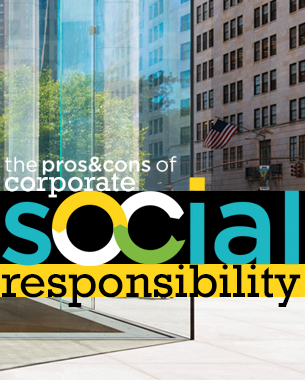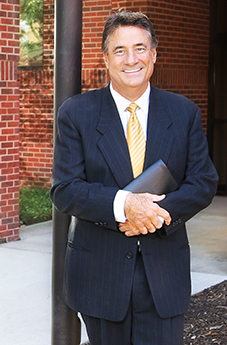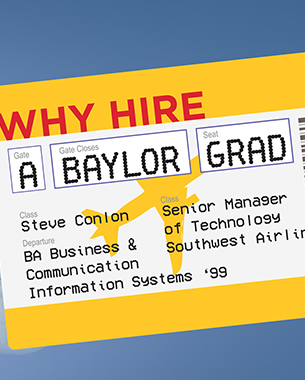By Franci Rogers
At first blush, the idea of corporate social responsibility seems like something every company should strive for.
Giving back to the community, or even the world, seems like a reasonable expectation for companies that want to “do the right thing.”
But Department of Management Chair and Associate Professor Blaine McCormick contends the concept is not always so black and white.
“As people, we have the urge to do good,” he said. “We are beings who want to help. We seek the good; we are attracted to the good. But sometimes our desire to do good harms other people.”
In the case of corporate social responsibility (CSR), the harm may be to shareholders.
“While corporate philanthropy sounds good, what’s really happening is that managers are giving away money,” McCormick said. “But where does that money come from? It comes from workers’ wages, customers’ pockets or the stockholders’ returns. A public corporation’s money is not the manager’s to give as he or she pleases.”
Business, McCormick said, was designed to increase profits. And some beloved American companies would seem to agree.
“[Founder] Steve Jobs never gave away a cent of Apple’s money,” he said. “He believed that Apple should pass that value on to their customers, shareholders and employees, and let them decide where that money should go.”
In contrast, McCormick cites retail giant Target.
“Unlike Apple, Target is in the business of giving away money. They promote the fact that they give away 5 percent of their profits,” he said. “One of their favorite charitable causes is art museums. From what I can determine, Target charges a 2 to 4 percent price premium in order to motivate these donations. I love art museums, but do I want to pay more at Target to fund them?”
McCormick also points to two shoe companies to illustrate his views.
“The founder of Nike, Phil Knight, personally gives a lot of money to charities,” he said. “But as a company, Nike does not seem to give much away. They create as much money as they can for their shareholders, and the shareholders can then donate to the charity of their choice.”
On the other hand, TOMS brand shoes has a company model where for every pair of shoes a customer purchases, a pair is donated to someone in need.
“Here at Baylor, I often hear that this is a good, Christian thing to do,” said McCormick. “But, I have to consider Jesus’ core teaching, from the Sermon on the Mount.” Jesus tells his followers that when they pray, they should do so in a closet, without spectacle. When they fast, not to be public about it. And when they give, to give in secret.
“Praying and having a good prayer life is hard work; fasting is hard work,” said McCormick. “I have every reason to believe that giving is going to be hard work, as well. I think Jesus would be very kind about it, and He would say if you do your good in public, you already have your reward. Target publicly gives away 5 percent, and I think they already have their reward—loyal customers, increased revenue and more.”
Individuals who use shopping as a way to give, McCormick believes, may have their reward already.
“A colleague calls it ‘lazy giving,’” he said. “There is an allure to shopping your way to a better world, but I’m not sure this is possible. You can support this machine if you want, but the split is not in your favor.”
But McCormick’s perspective on CSR isn’t the only one. The opposing view considers corporations citizens of their communities and so they are, therefore, bound to give financially in order to create a better community.
“There are some legal scholars who will tell you that corporations are created by society, and that they have responsibilities to the society that created them,” said John Martin, professor and Carr P. Collins Chair of Finance. “Financial economists take the view that firms belong to their owners, and it is the owners’ interests that should drive corporate decisions. So the question we must ask ourselves is the following: ‘In the context of shareholder interests, is there a case to be made for corporate social responsibility?’ I believe the answer is, ‘yes.’ Very simply stated, there are many instances in which being socially responsible, beyond obeying the law, is good for shareholders.”
To believe that corporations should only focus on return to its shareholders is what Martin referred to as the “Michael Douglas in Wall Street” theory. In the movie, Douglas’s character famously gives a speech declaring that, “greed is good.”
“In a world in which the stock price is always right, then greed or self-interest will lead to choices that do make everyone in society better off. However, this is not the world we all live in,” Martin said. “For example, many finance scholars now believe that investors can be caught up in what some call irrational exuberance, such that the current stock price may deviate from one that can be justified by full information. So focusing on share price, especially near term stock price variations, might lead to decisions by a firm’s management that are intended to enhance share value, but which may be misleading.”
He cautions, however, managers do have to keep profits for their investors in mind with all decisions.
“The crux of the corporate social responsibility argument is that non-owner corporate managers have the ability to make choices that may not be consistent with the interests of the shareholders to whom they owe a fiduciary duty,” Martin said. “For the owner-managed firm there is no such separation, and the social responsibility of the owner is simply to stay within the boundary of what is legal. But once you take money from members of the public, once you have investors, you have to pay attention to who really owns the store. It’s not just you anymore. You have responsibilities to all of your stockholders. And preferences of managers and stockholders don’t always line up, but that doesn’t mean you can’t use that money to maximize profits in other ways. Some acts of corporate social responsibility are good for business.”
Martin cites Whole Foods Chief Executive Officer John Mackey, who shared his views of CSR with shareholders in the 2007 Proxy Statement for the grocery retailer.
Mackey argued he was not only responsible to his shareholders, but to his stakeholders: customers, employees, investors, vendors, communities and the environment. Taking all of those into consideration, he said, creates the best possible scenario.“There can be little doubt that a certain amount of corporate philanthropy is simply good for business and works for the long-term benefit of the investors,” Mackey wrote.
In addition to many small donations made by Whole Foods, they also hold five “5% Days” each year. On those days, 5 percent of the store’s total sales is donated to a nonprofit organization. Organizations are chosen not simply on their own merits, but by the membership lists of each. Members or supporters are contacted by the organizations and asked to shop on that particular day. Whole Foods not only gets free advertising, but they estimate hundreds of new or lapsed customers shop that day, and that many of them become regular Whole Foods shoppers.
The Whole Foods customers who shop on the 5% Days don’t get to choose their charity, but some businesses do. Target allows customers to designate a school to receive a portion of the proceeds of your store credit card shopping as a donation from Target. The online retailer Amazon.com allows customers to choose from a list of charities and designate them as the recipient of a percentage of sales as well.
“I don’t see that as people being lazy givers or as giving up their control,” Martin said. “You could potentially save that money by shopping somewhere else and then donating that percentage to a charity, but you have to recognize the value of combining your donation with that of others, and you have to ask yourself what your time is worth. It is easier. But it also gives you benefits that are difficult to quantify in dollars and cents.”
Martin also noted that corporate philanthropy can be good for business by building the trust of the public, after all, “what is the value of trust?”
“From the very first day of class, I try to expose my students to the complexity of the world in which they will be working,” he said. “Doing the best you can for stockholders is paramount. But that alone doesn’t always lead to the right decisions. Doing the right thing is good for business.”
Baylor Business Review, Spring 2015













